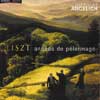Liszt Années de pèlerinage
Liszt's dark-hued journey of the soul is marked out in powerful performances
View record and artist detailsRecord and Artist Details
Composer or Director: Franz Liszt
Genre:
Instrumental
Label: Mirare
Magazine Review Date: 7/2004
Media Format: CD or Download
Media Runtime: 195
Mastering:
Stereo
DDD
Catalogue Number: MIR9941

Tracks:
| Composition | Artist Credit |
|---|---|
| Années de pèlerinage année 1: Suisse |
Franz Liszt, Composer
Franz Liszt, Composer Nicholas Angelich, Piano |
| Années de pèlerinage année 2: Italie |
Franz Liszt, Composer
Franz Liszt, Composer Nicholas Angelich, Piano |
| Années de pèlerinage année 3 |
Franz Liszt, Composer
Franz Liszt, Composer Nicholas Angelich, Piano |
Author: Bryce Morrison
The genesis of Liszt’s three-volume Années de pèlerinage is typically complex, extending from primitive beginnings to inspired revision and clarification. So much more than an obvious pilgrimage, they represent a journey of the soul through Switzerland’s alpine magnificence, Italy’s art and literature (all, for Liszt, part of God’s munificence) to what Alain Gallini in his excellent accompanying essay calls the ‘radiant and terrible pieces’ of the third and final année. And if it is argued that the third année conjures Liszt’s awareness of a pained and sorrowing universe, it could also be said that he was far too human not to express his own premonition of death, a prospect frighteningly without a traditional Catholic solace, a growing sense of isolation, the scorn of his contemporaries and guilt prompted by what he increasingly saw as his past glamorous but squandered life. In this sense the dark-hued prophecy of the third année is the most eloquent and powerful, as well as the least played of the three volumes.
And it is here that 34-year-old Nicholas Angelich, a prize-winning American but Paris-trained pianist comes into his own. Leaning, sometimes heavily, towards introspection, he backs his serious musicianship with a punishing technical command. In the first of the two Threnodies his rubato tugs, Arrau-like, against the melodic line recreating a frightening degree of stress in this ‘do not go gentle into that good night’ elegy. True, elsewhere in lighter territory, Angelich can bear down bruisingly on an outwardly tenuous argument, and in his performances of such winningly gentle numbers as ‘Au lac de Wallenstadt’ (where Liszt’s mistress Marie d’Agoult heard ‘the melancholy cadence of oars’) and ‘Eclogue’, he lacks the insouciance and transparency of, say, Kempff. But he roars into the rhetorical storms of the Dante Sonata with all guns blazing and here, as in ‘Orage’, the force and facility of his octaves are a notable part of his formidable mastery.
These, then, are honest and powerful performances and, like Lazar Berman’s often superb DG recordings of the cycle, are at their best in the darker regions of Liszt’s teeming imag-ination. Mirare’s sound is clear and bold even when it provides a black-and-white rather than sumptuously coloured listening experience.
And it is here that 34-year-old Nicholas Angelich, a prize-winning American but Paris-trained pianist comes into his own. Leaning, sometimes heavily, towards introspection, he backs his serious musicianship with a punishing technical command. In the first of the two Threnodies his rubato tugs, Arrau-like, against the melodic line recreating a frightening degree of stress in this ‘do not go gentle into that good night’ elegy. True, elsewhere in lighter territory, Angelich can bear down bruisingly on an outwardly tenuous argument, and in his performances of such winningly gentle numbers as ‘Au lac de Wallenstadt’ (where Liszt’s mistress Marie d’Agoult heard ‘the melancholy cadence of oars’) and ‘Eclogue’, he lacks the insouciance and transparency of, say, Kempff. But he roars into the rhetorical storms of the Dante Sonata with all guns blazing and here, as in ‘Orage’, the force and facility of his octaves are a notable part of his formidable mastery.
These, then, are honest and powerful performances and, like Lazar Berman’s often superb DG recordings of the cycle, are at their best in the darker regions of Liszt’s teeming imag-ination. Mirare’s sound is clear and bold even when it provides a black-and-white rather than sumptuously coloured listening experience.
Discover the world's largest classical music catalogue with Presto Music.

Gramophone Digital Club
- Digital Edition
- Digital Archive
- Reviews Database
- Full website access
From £8.75 / month
Subscribe
Gramophone Full Club
- Print Edition
- Digital Edition
- Digital Archive
- Reviews Database
- Full website access
From £11.00 / month
Subscribe
If you are a library, university or other organisation that would be interested in an institutional subscription to Gramophone please click here for further information.




